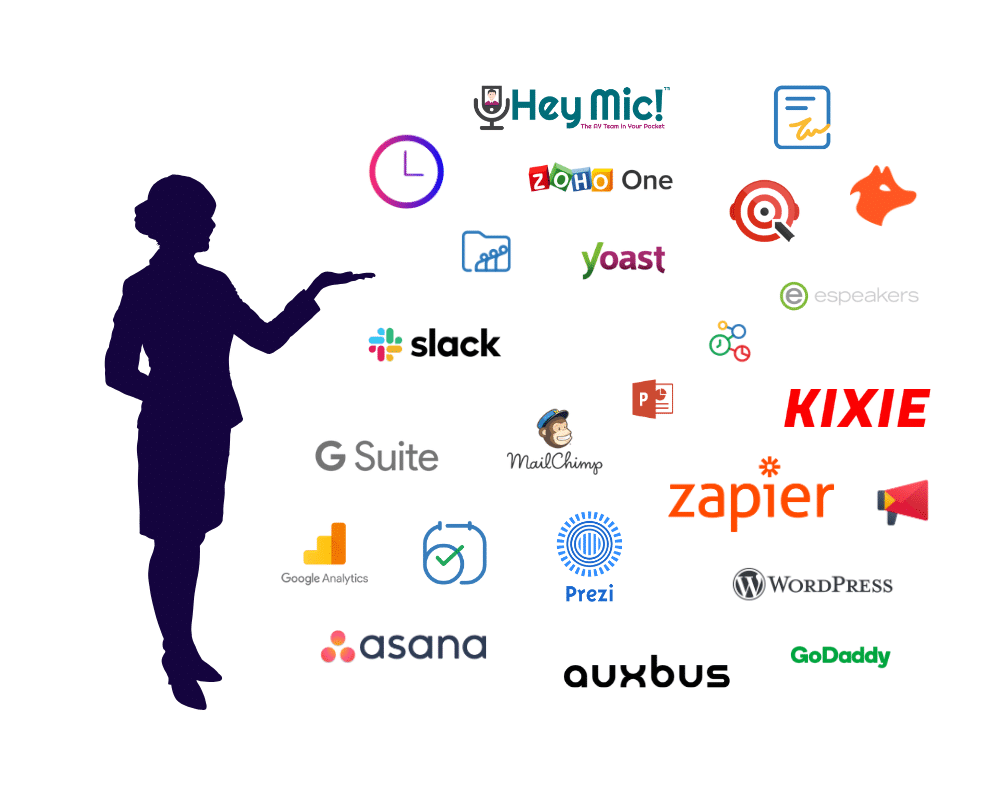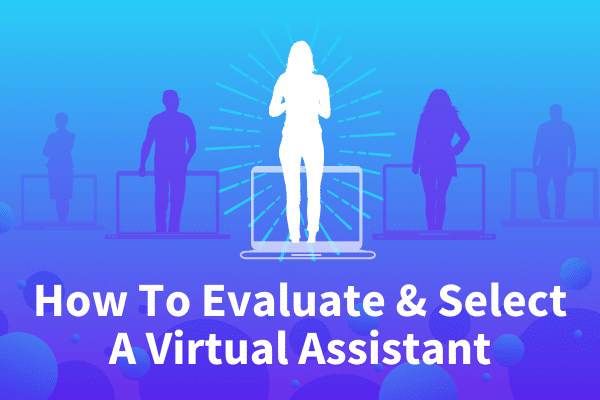Making the decision to hire a virtual assistant (VA) is the beginning of a new partnership for your speaking business. For many speakers, it also means no longer handling everything on their own. Just think of that, not having to handle events, sales, marketing, operations, and business odds and ends all by yourself! Ultimately, the goal of bringing on a virtual assistant is to improve your productivity by taking care of tasks you either cannot complete yourself or would rather have an expert tackle for you. This not only means more tasks completed in a shorter period of time. It also means more time for you to achieve your goals – whether they are to spend more time with your family or to focus on tasks that need your strategic attention.
If this sounds like you, as you plan for the coming months and beyond, you’ll first need to know how to evaluate and select a VA. After all, not every virtual assistant is made the same and having a VA is definitely not a one-size-fits-all situation. Luckily, we have you covered!
In this guide, we’ll break down the basics of hiring a virtual assistant, including who they are, what they do, and why they can be so helpful. That way, whether you’re planning to hire a VA now or a year from now, you’ll be able to know you’re making all the right choices.
What does a virtual assistant do?
To start, let’s talk briefly about some background information, including what a virtual assistant can do. Depending on the firm that employs them, a VA can be skilled in a variety of areas, including administrative work, sales, and marketing. In many cases, VAs can be hired for more than one of their advertised skills and for an extended period of time. For example, as a speaking business owner, you might hire a VA to help manage incoming leads and conduct outreach to event organizers on your behalf. In light of these responsibilities, it’s important to look for a VA that wants a long term commitment or a firm that can help you find another VA, in the event that one has to terminate their work with you later on. Although this can be found in small virtual assistant businesses, in many cases, this is where a VA firm comes in.
How much does a virtual assistant cost?
As far as cost is concerned, there are a few factors that impact the cost of hiring a virtual assistant. First is their skillset. As mentioned before, many VAs have extensive experience in many different skills. Because of this, their hourly or contract rate will be greater than a VA hired for a simple administrative project. The second factor, when it comes to cost, is how long you want to hire a VA to work for you. If you’re hiring them for a one-off, intensive project, it might cost more per hour than a long-term commitment, as the VA should be compensated for completing a job under a time crunch. Some companies, such as Virtual Assist USA, allow you to use their entire team of VAs with a range of skill sets for one price, so verify their hiring options upfront, if you’re hiring through a firm.
The last factor, in paying for a virtual assistant, is where you are hiring them from. As a general rule, hiring a VA that operates in your resident country will cost more than hiring one outside of it. If you are hiring through a firm, this may or may not be an option, so be sure to contact their support team directly before hiring your VA. That way, you don’t go over budget before your project even starts.
What should I consider, when hiring a virtual assistant?
In total, there are many things to consider when hiring a virtual assistant. What is the overall cost? What services are you looking for? Is your speaking business firing on all cylinders as of right now? All of these questions are important to iron out before hiring a VA, but there are three things to consider above all else.
Think about what your needs will be six months from now.

First, take a look at what you’re looking for currently and what you think you’ll be looking for later this year. Then, hire with those goals in mind. Will you need a virtual assistant who is well-versed in CRM management and sales assistance? On the other hand, will a VA with bookkeeping experience be more beneficial? What about a web designer, marketer, an administrative assistant and/or a sales team? Before you hire a VA, detail which of these projects are the highest priority. That way, you can hire accordingly.
From a financial perspective, this initial goal-setting is especially important. If you think about your speaking business when it first started, for example, you likely were working a crazy number of hours, trying to stay afloat. You also were probably on the hunt for resources, as you were new to the industry. Now, you’re a calm, collected, and confident speaker and business owner, looking to turn the money you’ve made on your own into an investment in your speaking business. In the same way, a year from now, you’ll hopefully be leaps and bounds from where you are now!
With this in mind, before hiring a virtual assistant, make sure that you know what your goals are. Then, break down the steps needed to meet those goals and the skillsets to make those steps do-able. Whether they’re financial, organizational, or structural goals, the key is to first understand them completely yourself. Once you’ve done that, you can communicate them to a VA with ease.
Give your virtual assistant the low-down on you.

The next step in the virtual assistant hiring process is outlining your expectations. While an ideal virtual assistant will come to you with loads of experience, education, and training under their belt, they will still need to be trained on the specifics of how you operate. To set yourself up for success with your virtual assistant, think through all of the information that a VA will need to know about you. These are items like your communication preferences and your working hours. It’s also important to cover how often you need to hear from them. Maybe you prefer a recap call at the end of each working day. On the other hand, there are clients who don’t want to hear from their VA unless it’s an acknowledgment that the project is done, too. Whatever your preferences, be clear about them from Day 1.
Additionally, once you’ve narrowed down your list of possible VAs to hire, check in with them about their own preferences. If you’re big on email rather than phone calls and they would always rather call, you’re probably not a good fit for each other. If you’re a digital native that loves technology and they’re a baby boomer that uses it only when necessary, you might want to look at other options.
Especially if you’re hiring for the long-term, making sure you’re both on the same page about these preferences isn’t just the key to a smooth working relationship. It’s also bound to make your work together more efficient, giving you quicker and more consistent results and a better return on investment. Plus, you’ll both be happier during working hours! What’s not to love about that?
Outline the technology you both will be using.
Finally, make sure to list all of the tools and apps in your tech stack. This is important not only because of task assignments but also because of communication. If you are an Apple user, for example, and you hope to FaceTime your VA every day, you don’t want to hire a VA that only uses a PC.

All in all, it comes down to asking the right questions. Do you need them to have a Macbook so that you can share Pages and your Apple calendar? Or do you primarily use Windows and therefore would like someone with access to all of the Windows/Microsoft products? Keep in mind, also, that as the speaking industry continues to evolve into a largely virtual world, it’s important to hire a virtual assistant who has experience with virtual conferencing platforms, like Zoom. The biggest mistake that you can make is to assume that everybody uses the same technology you do.
In addition to technology, don’t forget about outlining soft skills. The savviest speakers will hire a virtual assistant who demonstrates resourcefulness and problem-solving, especially because of the increasing competitiveness of the industry. Additionally, speaking can be a high-urgency environment with tight deadlines, requiring a virtual assistant who can find quick, clever solutions in tough situations. In short, while tech-savviness is important, resourcefulness, self-motivation, and optimism are key indicators of a successful virtual assistant, too.
In Conclusion…
Ultimately, the decision to hire a VA should not be taken too lightly. Consider it a business investment, ask the right questions, and establish your needs right off the bat. Don’t wait until you’ve found someone you get along with, only to discover that they are not around when you need them to be. Furthermore, don’t hire someone only to have wasted all of your efforts and time when you find out they don’t have the right skills!
Consider utilizing a company like Virtual Assist USA that will give you on-demand, instant access to a wide variety of skill sets on a virtual team, as well as some protection and guarantees in case things don’t work out. Not only will you ultimately hire a stellar virtual assistant. You’ll also have piece of mind that the company behind your VA has your best interests at heart, too.
For more information about Virtual Assist USA, check out their website and pricing packages or call them directly at (412) 437-8243. Special thanks, too, to Virtual Assist USA’s founder and CEO, Danielle Cuomo for her insights in this guide.





